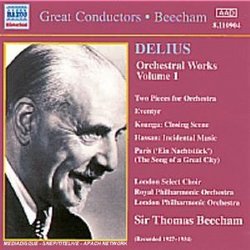| All Artists: Frederick Delius, Thomas Beecham, London Philharmonic Orchestra, Royal Philharmonic Orchestra Title: Delius: Orchestra Works, Vol. 1 Members Wishing: 0 Total Copies: 0 Label: Naxos Release Date: 6/13/2000 Genre: Classical Styles: Opera & Classical Vocal, Forms & Genres, Symphonies, Historical Periods, Modern, 20th, & 21st Century, Symphonies Number of Discs: 1 SwapaCD Credits: 1 UPC: 636943190425 |
Search - Frederick Delius, Thomas Beecham, London Philharmonic Orchestra :: Delius: Orchestra Works, Vol. 1
 | Frederick Delius, Thomas Beecham, London Philharmonic Orchestra Delius: Orchestra Works, Vol. 1 Genre: Classical
|
Larger Image |
CD Details |
CD ReviewsHow Beecham conducted Delius in the 1920s and 1930s. John Austin | Kangaroo Ground, Australia | 10/24/2001 (3 out of 5 stars) "Lovers of the music of Delius will not want to be without this collection of the first attempts by his great champion, Sir Thomas Beecham, to record his works. All the items on this CD were recorded between the years 1927 and 1934. The 1934 items were produced for the first volume of the Delius Society, by Walter Legge, working for the first time with Sir Thomas Beecham. How do they sound in 2000? Despite Beecham's care over phrasing and balance, the presence of the great oboe player Leon Goossens in the orchestra ranks, and the efforts of David Lennick in transferring the wobbly old originals to CD, the results are sonically no more than tolerable. About one third of the long series of recordings Sir Thomas Beecham made with his London Philharmonic Orchestra in the 1930s still sound well, but these are not amongst them. The sound has no transparency. Orchestral colour and sonority is severely limited. The recordings from the 1920s sound better than those of 1934. Fortunately all the items were subsequently re-recorded by Sir Thomas, many of them in stereo, and most of them are still currently available. As the Naxos CD is at super budget price, expense is not likely to be a consideration for committed Delius enthusiasts, but no one should expect this historical issue to win new converts." On hearing the first Delius in 2005. DAVID BRYSON | Glossop Derbyshire England | 01/20/2005 (4 out of 5 stars) "This is a disc for people who have already got the Delius bug and know the composer, not for newcomers. A first-class job has been done by David Lennick in giving these recordings, some of which are nearly 80 years old, an acceptable sound for the third millennium, but there are limits to what he or anyone can do in that department.
There were very few limits indeed to what Beecham could make an orchestra do. Delius is all about sound, not about musical structure or dramatic effect, probably not even much about emotional expression as a rule. It says a lot for Mr Lennick, and I dare say for the recording engineers of the 20's and 30's, that so much of the special Beecham magic in this composer still manages to communicate itself through these recordings. Beecham was still in his 20's when he discovered and fell in love with the music of Delius, and I doubt whether any modern composer has benefited so much from the consistent advocacy of any interpreter. In general Beecham was lukewarm at best regarding British composers (unless you count Handel), but I would say Delius does not have an English sound to him. He is deeply original, but the nearest I can think of would be his younger and greater contemporary Ravel. They are both magicians with the orchestra, although Delius's range of expression is more limited. The pieces here are well-known and very typical, all languorous orchestration and mainly at some variety of andante tempo. No deficiency in the recorded quality could disguise Beecham's resourcefulness and tact, and a surprising amount of the richness of the sound still manages to come through. In particular I still felt a thrill at the sound of the bass at the start of Paris, the biggest piece in this selection. This disc is the first of a series, of which I'm aware of three so far. There are later Delius recordings by the same conductor that would be a safer recommendation for newcomers, but these early performances have something special about them for all that. Some of them were done while the composer was still alive, and the rest date from only months after his death in 1934, and are obviously intended as a memorial. Delius knew how lucky he was to have Beecham promoting his work. I heard Beecham once on the subject of Delius's own conducting, to the effect `There are bad conductors, and dreadful conductors, and appalling conductors...and there was dear Frederick. He would beat five in a bar of four...'etc etc. Happily he got the thing done for him. The liner-note by Lyndon Jenkins, chairman of the Delius Society, is short but informative and to the point, a model of how such notes can be done." |

 Track Listings (7) - Disc #1
Track Listings (7) - Disc #1